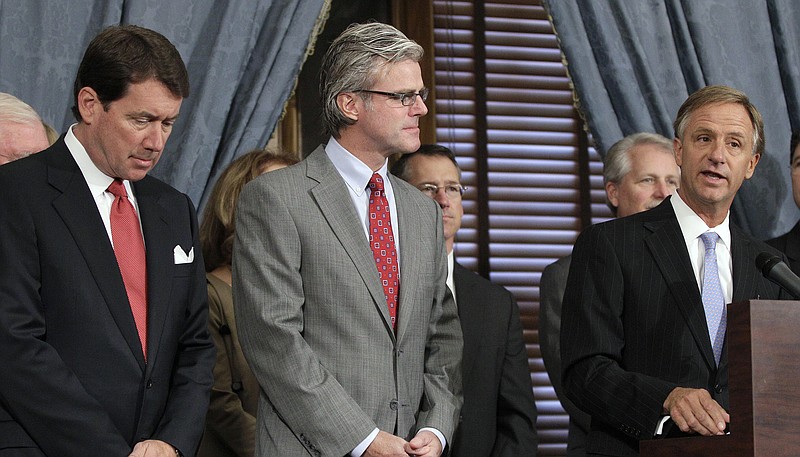NASHVILLE - Gov. Bill Haslam revealed Monday that Tennessee is facing a legal challenge to the state's requirement that larger online vendors collect state and local sales taxes on purchases made here.
The new sales tax rule took effect Jan. 1.
The governor's comments came during a question-and-answer session with a Republican Nashville group, during which he emphasized the challenge was both expected and desired to get the decades-old issue back before the U.S. Supreme Court.
 FILE - In this Dec. 2, 2013 file photo, Amazon.com employees organize outbound packages at an Amazon.com Fulfillment Center on "Cyber Monday" the busiest online shopping day of the holiday season, in Phoenix. Buying things online could soon get pricier for many people after the U.S. Supreme Court's decision Monday, Dec. 12, 2016 not to get involved in a case that may lead to states collecting billions in lost sales taxes. The court opted not to hear a challenge to a Colorado law requiring internet retailers to notify customers and the state how much they owe in Colorado taxes. (AP Photo/Ross D. Franklin, file)
FILE - In this Dec. 2, 2013 file photo, Amazon.com employees organize outbound packages at an Amazon.com Fulfillment Center on "Cyber Monday" the busiest online shopping day of the holiday season, in Phoenix. Buying things online could soon get pricier for many people after the U.S. Supreme Court's decision Monday, Dec. 12, 2016 not to get involved in a case that may lead to states collecting billions in lost sales taxes. The court opted not to hear a challenge to a Colorado law requiring internet retailers to notify customers and the state how much they owe in Colorado taxes. (AP Photo/Ross D. Franklin, file) "[The] Supreme Court wants to look at that again," he said. "So we figured when we passed it that we would be sued. We have been sued. My own guess is that, eventually, sooner or later, that will work it's way up to the Supreme Court. There are several states in that situation."
Haslam Press Secretary Jennifer Donnals later clarified that technically the state has not been "sued" in a court.
"The Governor was referring in general terms to a legal challenge to the remote seller rule," Donnals said in an email response. "More specifically, the challenge is in the form of an administrative proceeding in the Department of Revenue that initially begins with the filing of a petition."
Those proceedings are secret because of what Donnals said are state confidentiality laws regarding taxpayer information.
"At this time, the department cannot release the name of the petitioners or a copy of the petition," she added.
At issue are two U.S. Supreme Court rulings in the 1960s and 1990s, which held states can only require vendors to collect their sales taxes if they have a physical presence within the state. Otherwise, it's a violation of the U.S. Constitution's interstate commerce clause.
The Haslam administration initiated the rule after Supreme Court Justice Anthony Kennedy in essence welcomed challenges by states to the decades-old rulings, which dealt with catalog sales.
Since then, several states, including Tennessee, have started pushing new laws or administrative rules they expect to be challenged.
In Tennessee, many major brick-and-mortar retailers and some similar mom-and-pop stores object to the advantage that competitors like Overstock.com and eBay enjoy.
Tennessee's 7 percent state sales and local government option sales taxes of up to 2.75 percent give the competition a nearly 10 percent advantage on price. Traditional retailers say that because they must collect the levy, their online competitors have effectively been bestowed with a government-imposed advantage over them.
Last year, the state Revenue Department held hearings and issued the new rule, requiring internet retailers to collect sales taxes in Tennessee if they have annual sales of $500,000 or more here.
"We did that knowing we would be sued and we were because there are people saying there was a Supreme Court decision back when out-of-state sales basically happened through catalogs, when that was 1 percent of the retail world instead of the 25 percent or 30 percent it is now," Haslam told Nashville Republicans. "And there was a decision before the Supreme Court that said you have to have a physical presence in the state to collect sales taxes.
At the state level in Tennessee, the Revenue Department's proposed rule came before a joint meeting of the House and Senate Government Operations Committees, which must pass on proposed state agency rules.
Internet retailers and some Tennessee-based companies objected and lobbied lawmakers.
In the end, the two panels opted for a "neutral" recommendation.
The internet sales rule is now part of an omnibus package of various agencies' proposed rules that will wind up eventually going to the House and Senate floor.
But opponents are expected to try to strip the Revenue Department rule from the omnibus bill.
"Under the rule, applicable out-of-state dealers should register with the Department by March 1, 2017, and begin collecting sales tax by July 1, 2017," said Kelly Cortesi, Revenue Department spokeswoman, in an email.
Cortesi also said the rule is included in a general rules omnibus bill and would become permanent upon the measure's passage "unless it is amended out."
The rule is Tennessee Revenue Rule 1320-05-01-.129(2).
Contact staff writer Andy Sher at asher@timesfreepress.com or 615-255-0550. Follow on Twitter @AndySher1.
